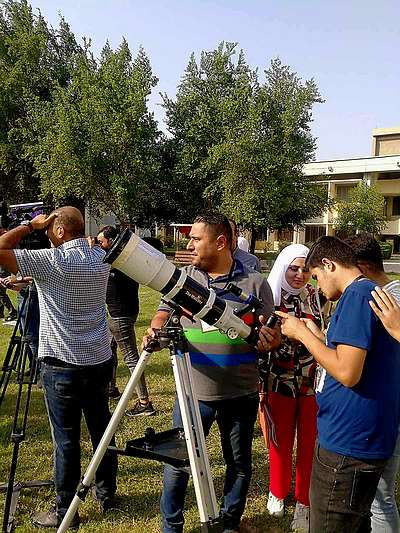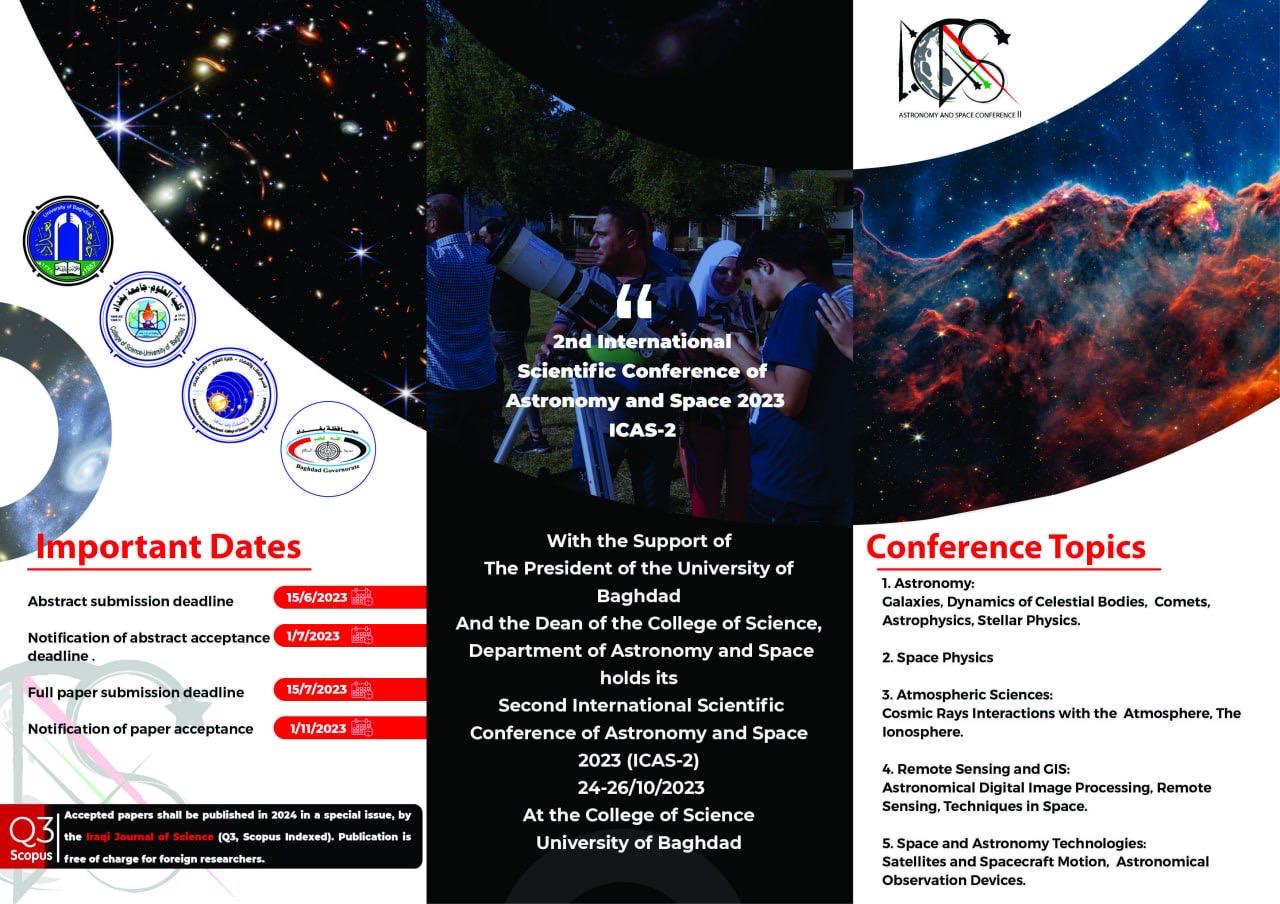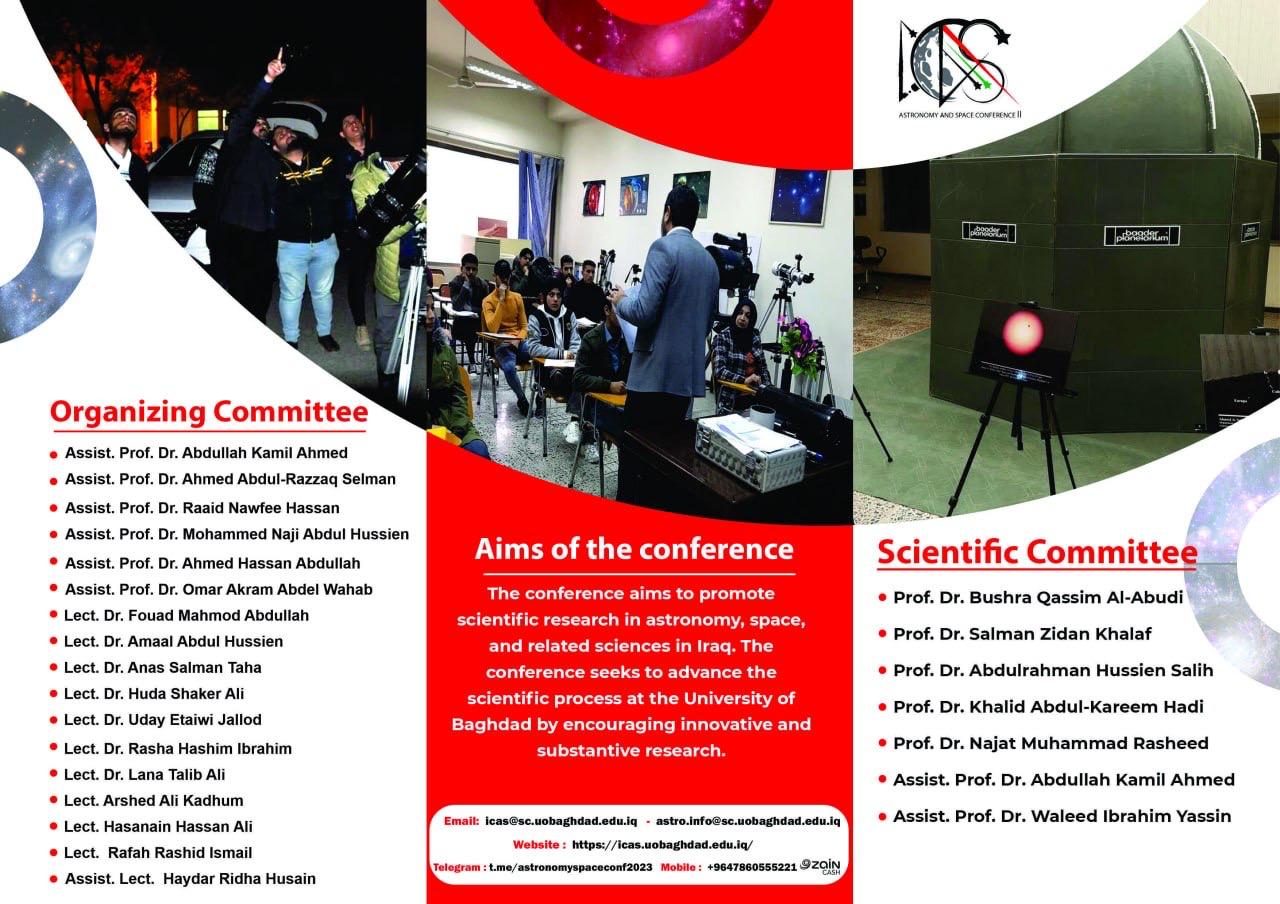Aim of The Conference
The conference aims to promote scientific research in astronomy, space, and related sciences in Iraq. The conference seeks to advance the scientific process at the University of Baghdad by encouraging innovative and substantive research.
Conference Topics
- AstronomyGalaxies, Dynamics of Celestial Bodies, Comets, and Stellar Physics
- Space Physics
- Atmospheric Sciences Cosmic Rays Interactions with the Atmosphere, The Ionosphere
- Remote Sensing and GISAstronomical Digital Image Processing, Remote Sensing, Techniques in Space
- Space and Astronomy TechnologiesSatellites and Spacecraft Motion, Astronomical Observation Devices
Registration
Please register here. Registration is managed by the conference committee and any queries should be directed to [email protected]
All accepted submissions will be assigned an oral presentation. All papers should adopt the current Iraqi Journal of Science template in Microsoft Word format. Please submit papers in Microsoft Word format using the current Iraqi Journal of Science template.
All contributions will be judged by the scientific committee upon rigorous peer review standards for quality and fit to the conference qualification, by at least three referees.
Additionally, papers that have been accepted for presentation at the conference will also be considered for further revision by the Iraqi Journal of Science for possible publication in the journal. In the case of the acceptance of publishing, the journal procedures will need to be followed.
Authors with accepted papers should provide us with a PowerPoint presentation (pptx or ppxx only) and their short bio (a couple of sentences) via: [email protected] before 21 October 2023.
For the conference registration as an attendance, please fill out the form
Publishing fees:
- Publishing in Iraqi Journal of Science is free for foreign authors
- The Iraqi researchers should pay an amount of 100.000 ID on submission of the research. Other fees of 150.000 ID payable on approval of publishing if the paper contains 12 pages or less for covering the coasts of publishing & plagiarism when the manuscript contains more than 12 pages, researchers are directed to pay 2.500 for any additional page
- If the manuscript contains figures and colored tables the author is bound to pay 5.000 ID for each page containing figures and colored tables
Important Dates
- Abstract submission deadline 15/6/2023
- Notification of abstract acceptance 1/7/2023
- Full paper submission01/09/2023
- Deadline for receiving presentation and Bio21/10/2023
- Notification of paper acceptance 1/11/2023
- Publishing in 2024 in a special issue
Scientific Committee
- Prof. Dr. Bushra Qassim Al-Abudi
- Prof. Dr. Salman Zidan Khalaf
- Prof. Dr. Abdulrahman Hussien Salih
- Prof. Dr. Khalid Abdul-Kareem Hadi
- Prof. Dr. Najat Muhammad Rasheed
- Assist. Prof. Dr. Abdullah Kamil Ahmed
- Assist. Prof. Dr. Waleed Ibrahim Yassin
Advisory Committee
- Prof. Hamid M. K. Al-NaimiyChancellor at the University of Sharjah – United Arab Emirates/president
- Prof. Magdy Y. AminHead of Department of Astronomy/Cairo University- Egypt / Member
- Prof. Jad Mohammed Al-QadiNational Research Institute Of Astronomy & Geophysics- Egypt/ Member
- Prof. Hadia Hassan SelimNational Research Institute Of Astronomy & Geophysics- Egypt/ Member
- Prof. Hanna Anton SabbatRegional Center for Space Science and Technology Education for Western Asia- Jordan/ Member
- Prof. Zaki Abdul Rahman AbdullahKing Abdulaziz City for Science and Technology – Saudi Arabia/ Member
- Prof. Abdulrahman MaghrabiKing Abdulaziz City for Science and Technology – Saudi Arabia/ Member
- Prof. Kamal M. AboodDean of Faculty of Remote Sensing and Geophysics – Karkh University of Science/ Member
General Committee
- Assist. Prof. Dr. Abdullah Kamil Ahmed
- Assist. Prof. Dr. Ahmed Abdul-Razzaq Selman
- Assist. Prof. Dr. Raaid Nawfee Hassan
- Assist. Prof. Dr. Mohammed Naji Abdul Hussien
- Assist. Prof. Dr. Ahmed Hassan Abdullah
- Assist. Prof. Dr. Omar Akram Abdel Wahab
- Lect. Dr. Fouad Mahmod Abdullah
- Lect. Dr. Amaal Abdul Hussien
- Lect. Dr. Anas Salman Taha
- Lect. Dr. Huda Shaker Ali
- Lect. Dr. Uday Etaiwi Jallod
- Lect. Dr. Rasha Hashim Ibrahim
- Lect. Dr. Lana Talib Ali
- Lect. Arshed Ali Kadhum
- Lect. Hasanain Hassan Ali
- Lec. Rafah Rashid Ismail
- Assist. Lec. Haydar Ridha Husain
About The College
College of Science was established on 27/3/1949 corresponding to 20 / Jumada I / 1368 as part of the College of Arts and Sciences, it has identified the main duties care of science and liberal arts without adhering to the goal of graduation (professionals) specialists in applied sciences (narrow), It contributed to the emergence of the first seed of modern scientific university education in Iraq, and it became the day of the establishment of the college (the Day of Science) in our country with merit. At the beginning of its establishment and establishment, the college included five scientific departments (chemistry, physics, mathematics, zoology, and botany), and later on, the departments of zoology and botany were merged and called the Department of Life Sciences.
In 1953, the Department of Earth Science (Geology) was opened and received the first group of students in 1954. In 1983, the Department of Computer Science was established as an important link for the development of higher education in the country, and given the great importance witnessed by computer technology in the world, this young department has become a Distinguished follow-up and care. In 1992, before the introduction of preliminary studies, the Institute of Biotechnology for Postgraduate Studies was opened in the college, which is the only institute concerned with this vital scientific field, whether at the level of academic research or in meeting the needs of other sectors.
During its relatively long career, the College of Science witnessed important scientific developments, perhaps the most prominent of which is the opening of new departments to keep pace with scientific development. The postgraduate project (Master’s) in the departments of mathematics and chemistry, and in 1965 began to apply the same foundations in the Department of Physics, and 1966 the Department of Earth and Life Sciences became within the general scheme of this approach, after that a doctoral study was developed in the departments of Chemistry and Life sciences in 1976, then the Department of Mathematics and Earth Sciences in 1977, and then the Department of Physics in 1978, and in 2015 the Department of Remote Sensing and Geographic Information Systems was created so that one can prepare for the College of Science (Academic) graduate in these disciplines With this expansion of knowledge, science, and technology, it was necessary to expand the size of the college and diversify its facilities, facilities, and achievements. Therefore, the college moved from its old building in Adhamiya to the Baghdad University complex in Jadriya in 1983, where the college departments are distributed over a large area of land, including Modern buildings designed for their purposes well, and surrounded by gardens that give the atmosphere of science and work a feature of order and stability. In view of the (cognitive) expansion to prepare students and the added fields of knowledge (sub- and detailed), it was decided to establish new buildings for the departments of Mathematics and Computer Science.
The college has been able to supply large numbers of scientifically qualified graduates who hold bachelor’s, master’s, and doctoral degrees, and in 1992 the college established an advisory office that is considered an advanced scientific edifice that aims to organize the relationship between the college and other state institutions to provide advisory, scientific, and technical services at the scientific level. universally recognized. Many deans have succeeded in the deanship of the college, who have great credit for the college, with what they achieved in terms of modernization and change that benefit and go in line with the style of development and urbanization that prevails in the world. The Department of Astronomy and Space was established in 1998 as one of the departments of the College of Science University of Baghdad. It’s the only academic institute in Iraq that provides degrees of BSc MSc and PhD degrees in astronomy science. This department is the inheritor of the Iraqi space project developed in the 80s and 90s, it was planned to control and maintain the national Iraqi observatory supposed to be built in Iraq in 2001, and to establish the Iraqi Space Agency as well as other national astronomy and space projects in Iraq.
Also, the department is responsible for promoting aspects of astronomy signs in Iraq and related fields. The department has represented the National Adhering Organization of Iraq in the International Astronomical Union IAU since 2021. Currently, there are 13 members from the Department in the IAU out of 19 active and junior members from Iraq. The department is known for its splendid activities and educational fields where the department has held many occasions for education for public activities such as stargazing or educational lectures or webinars or seminars, in a total of over a hundred activities in the past five years only. Currently, the department works with many official and unofficial institutes inside and outside the university to promote astronomical science and support astronomy graduates.
About The Department of Astronomy and Space
The Department of astronomy and space was established in 1998 as one of the departments of the College of Science University of Baghdad. It’s the only academic institute in Iraq that provides degrees of BSc MSc and PhD degrees in astronomy science. This department is the inheritor of the Iraqi space project developed in the 80s and 90s, it was planned to control and maintain the national Iraqi observatory supposed to be built in Iraq in 2001, and to establish the Iraqi Space Agency as well as other national astronomy and space projects in Iraq.
Also, the department is responsible for promoting or aspects of astronomy signs in Iraq and related fields. The department represents the National Adhering Organization of Iraq in the International Astronomical Union IAU since 2021. Currently, there are 13 members from the Department in the IAU out of 19 active and junior members from Iraq.
The department is known for its splendid activities and educational fields where the department has held many occasions for education for public activities such as stargazing or educational lectures or webinars or seminars, in a total of over a hundred activities in the past five years only. Currently, the department is working with many official and unofficial institutes inside and outside the university to promote astronomical science and support astronomy graduates.
Venue
The conference will be held from 24-26/10/2023 in the College of Science / University of Baghdad.














